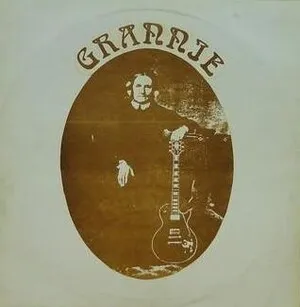Grannie (1971)
As someone who remembers the days before the internet was available to the public, I am still often amazed by how much easier it has become to access rare recordings. Once upon a time, if a certain obscure album only had a single pressing of, say, 100 copies, way back in a year like, say, 1971, then there seemed to be little or no possibility of the album ever being obtainable by almost anyone. Before the digital age, physical media was usually the only way to hear such an album -- and what were the odds of getting one's hands on an album as obscure as that? It was highly unlikely that you would find such an album in a record store, and even if you did, why would you have any interest in purchasing a recording that was so unknown? It was equally unlikely that such a record would get played on a radio station, even a hip college station or anything like one, except maybe in the artist's home town. Would homemade cassette tapes have circulated? Probably only within a small community, if at all. Before we had access to websites like Discogs or eBay, there were few resources that enabled record hunters to peruse record store inventories on a global level. And even if we could, a record like the one I'm describing would simply be overlooked by most people -- if, in fact, any record store in the world did have it available for sale. And the concept of listening to an album online, by way of a contemporary device? That was hard to even imagine back then.
So...imagine how amazed -- and grateful -- I am that it is now possible to stumble upon the existence of such an album simply by using a computer! The album I am referring to in this case is the self-titled album by an unknown U.K. rock band called Grannie, who recorded only one 1971 album, which only had about 100 copies pressed (basically serving as their demo) -- and then the band broke up. If not for the internet, evidence of that album's existence would probably have disappeared long ago from the face of the earth.
Grannie was a four-man, one-woman band formed by lead guitarist Phil Newton (who wrote the six long tracks on their self-titled album) and bassist Dave Holland. Their sound was a guitar-driven brand of progressive rock that was influenced by other styles of the time period, often reminiscent of Cream, King Crimson, and CS&N -- sometimes all in one song. The flute playing by Jan Chandler (Newton's wife-to-be) often gave the low-budget recording a slightly otherworldly quality, especially on "Romany Refrain" and "Dawn". The band also had a distinctive vocalist in Fred Lilley. The nine-minute closing track "Coloured Armageddon" is given added color by keyboards. Reportedly recorded live-in-the-studio in just one 8-hour session, Grannie is a rough prog-rock pearl that is worth digging up over a half-a-century later.

Grannie "Grannie" (S.R.T. SRT 71138A) 1971
Track Listing:
1. Leaving
2. Romany Refrain
3. Tomorrow Today
4. Saga Of The Sad Jester
5. Dawn
6. Coloured Armageddon
So...imagine how amazed -- and grateful -- I am that it is now possible to stumble upon the existence of such an album simply by using a computer! The album I am referring to in this case is the self-titled album by an unknown U.K. rock band called Grannie, who recorded only one 1971 album, which only had about 100 copies pressed (basically serving as their demo) -- and then the band broke up. If not for the internet, evidence of that album's existence would probably have disappeared long ago from the face of the earth.
Grannie was a four-man, one-woman band formed by lead guitarist Phil Newton (who wrote the six long tracks on their self-titled album) and bassist Dave Holland. Their sound was a guitar-driven brand of progressive rock that was influenced by other styles of the time period, often reminiscent of Cream, King Crimson, and CS&N -- sometimes all in one song. The flute playing by Jan Chandler (Newton's wife-to-be) often gave the low-budget recording a slightly otherworldly quality, especially on "Romany Refrain" and "Dawn". The band also had a distinctive vocalist in Fred Lilley. The nine-minute closing track "Coloured Armageddon" is given added color by keyboards. Reportedly recorded live-in-the-studio in just one 8-hour session, Grannie is a rough prog-rock pearl that is worth digging up over a half-a-century later.
Grannie "Grannie" (S.R.T. SRT 71138A) 1971
Track Listing:
1. Leaving
2. Romany Refrain
3. Tomorrow Today
4. Saga Of The Sad Jester
5. Dawn
6. Coloured Armageddon
Comments